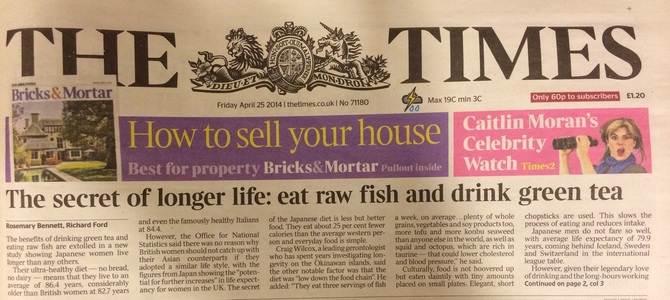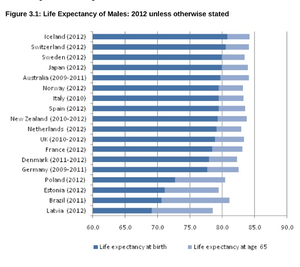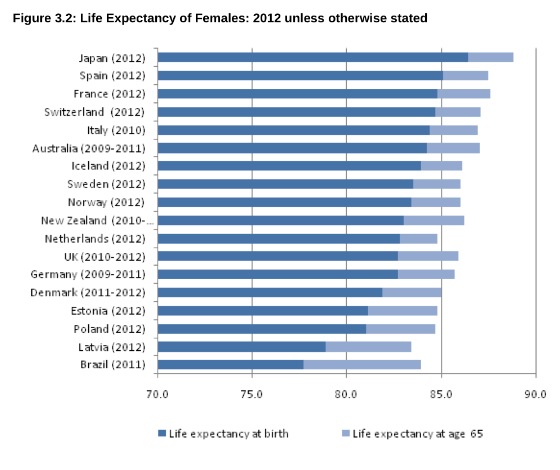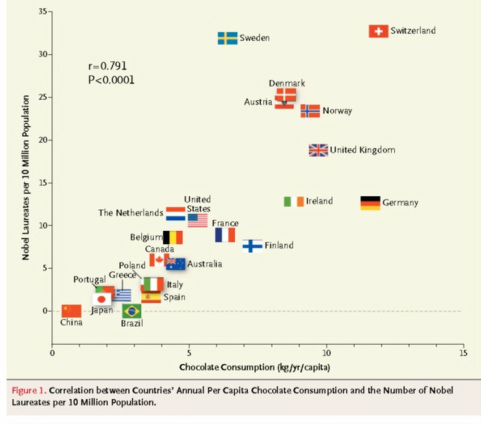 Friday 25th April 2014- The Times, front page news, above the crease. The story must be important. It is they have discovered the "Secret of longer life". Here is the skill of the journalist. Take a study just published. Read it and Identify one fact from all the results which makes the hook for the story. In this case Japanese women have the highest life expectancy. Then find a plausible association. What do we know about Japan? Ah well Sushi? - that's raw fish and Green Tea? Well that must be the cause of the long survival and there it is you have your story and your headline and your front page. So what lies behind this news and is there any credibility in the conclusion. The Office for National Statistics published an international Compendium of Data on population statistics today. Much of the report will fuel the current debate around UK immigration as there is a substantial amount of data on population migration and enough material in the report to satisfy the needs of the pro as well as the anti-European debate and to prove either groups case! The life expectancy data comes later and leads to the headline. Well I'm sorry to have to disappoint but I am afraid that the secret of longer life isn't about raw fish or green tea. Sadly the journalists haven't been entirely transparent with the facts. It is true that Japanese females do have the highest life expectancy at birth (86.4 years) but the country with the highest male life expectancy at birth at 80.8 years was Iceland. Now it is true they eat a lot of fish in Iceland. In fact a recent FAO report indicates that the annual fish consumption in Iceland is 80.5kg/year compared to just 55.2 in Japan. So you could ask if fish in the diet was so important why didn't the Icelandic women top the Japanese. Well perhaps it's the type of fish, or the way it's cooked or not cooked. More likely perhaps this is simply an association which tells you nothing about causation. It could be the play of chance or any number of other factors which confound the association between the diet and life expectancy. its almost as bizarre as thinking that the amount of chocolate you eat determines the chance of winning a Nobel prize.
0 Comments
 Are you confused about what to eat? It can't be because of lack of information. Search Google today for the word "diet" and it will give you over 136 million hits with over 4 million in the News section alone. Most stories are here today and gone tomorrow and who bothers to look at the evidence behind the headline. Take the one on today's front pages: "Eating too much meat and eggs is as deadly as smoking." Really? Taken at face value this should be a public health emergency. Warnings on plates used to serve the full English breakfast ought to be introduced, we might even call for an ingestion charge on meat and eggs! But probably what will happen is that we will forget the headline by tomorrow certain in the knowledge there will always be another story this time telling us that too much fat or sugar or carbohydrate or this or that is bad. Confused about what the best diet is? Of course you are who wouldn't be? With so much conflicting information it is difficult to know what to believe. So what of the study reported today? Should we worry about meat and eggs? Are they really as dangerous as smoking?The story comes from a paper published in Cell Metabolism. This is a "good journal" with a very high impact factor. In other words you would be proud to have your research published there. The study followed 6.381 adults, 50 years old and over for 18 years. So far so good, a large study sample with long follow up. They found that people with diabetes were more likely to die from diabetes if they had a high protein intake. They assessed protein intake using a diary card for 24h at the start of the study ie about 20 years ago. Are you still eating the same diet as you were 20 years ago? I thought so but anyway not to worry the authors assumed that the people's diet remained unchanged for 20 years. When the results were analysed there were no differences in death rates overall, cancer or cardiovascular deaths. Now this ins interesting because the group eating a lot of protein had a much higher proportion of diabetic patients and you would have though that the cardiovascular death rate would be higher in that group. Then if you look at the data more carefully you notice that the death rate from diabetes in the study is very low indeed (about 1in 100). Most people died of cancer or cardiovascular disease as expected The proportion of diabetics in the high protein group was 17% whereas it was only 2.6% in the low protein group. Presumably this reflects the advice given previously by diabetes specialists to recommend high protein diets to diabetics as it was thought that the blood sugar levels were easier to control. So this group has far higher numbers of diabetics and if you look at the proportion of diabetics in each group which died of diabetes then it is 7.7 for the low, 8.7 for the intermediate and 11.8 for the high protein groups. Not so different and because the numbers are small the accuracy is low. Not withstanding this the investigators analysed the data some more and managed to find an association between age, protein consumption and cancer mortality. If you are 50–65 years you get benefit from a low protein intake but once you are over 65 then it is harmful. Is this biologically plausible? So that's just one headline on one day. But there is a message there: Meat and eggs are as deadly as smoking. This is confusion at best and harmful at worst as this study really doesn't support that conclusion. In the end it is likely that the public, seeing so many stories which apparently contradict each other, will decide that no-one really knows what the best diet is and carry on eating their usual food. |
Dr Richard BogleThe opinions expressed in this blog are strictly those of the author and should not be construed as the opinion or policy of my employers nor recommendations for your care or anyone else's. Always seek professional guidance instead. Archives
August 2023
Categories
All
|



 RSS Feed
RSS Feed

